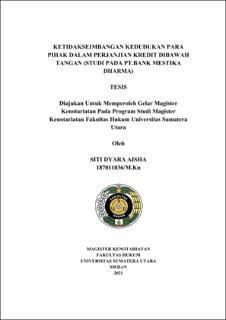| dc.description.abstract | In banking credit practices, there are clauses that require customers to comply with all bank instructions and regulations, both existing and future. This study aims to determine whether private loan agreements adequately accommodate the interests of both banks and debtors, identify legal issues in private loan agreements, and examine legal protection for parties involved in these agreements.
The research method used is normative juridical research, and it is descriptive- analytical in nature. Data collection techniques include library research and field research, involving document studies and interviews. The data obtained are analyzed qualitatively, and conclusions are drawn deductively.
The research findings indicate that private loan agreements do not yet fully accommodate the interests of both banks and customers. Private loan agreements at Bank Mestika Dharma have weaknesses in terms of evidence, as such agreements should be accompanied by additional evidence. Legal protection due to the imbalance of clauses in private loan agreements at Bank Mestika Dharma's Medan Branch provided to debtors includes Article 1, paragraph I of Law Number 8 of 1999, Law Number 10 of 1998 concerning amendments to Law Number 7 of 1992 concerning Banking in Article 29, paragraph (1), consumer protection provided by the Financial Services Authority (OJK), Article 29, paragraph (3) of Law Number 10 of 1998 concerning amendments to Law Number 7 of 1992, and Article 29, paragraph (4). Debtors can file lawsuits with the Court or Consumer Dispute Resolution Agency. It is advisable for creditors to also consider the debtor's background when drafting private loan agreement clauses to prevent an imbalance of rights between creditors and debtors. It is recommended to formalize credit agreements with debtors using a notary deed to ensure full evidentiary strength. All parties are encouraged to actively clarify clauses in private loan agreements by including provisions for default and compensation for losses. | en_US |


